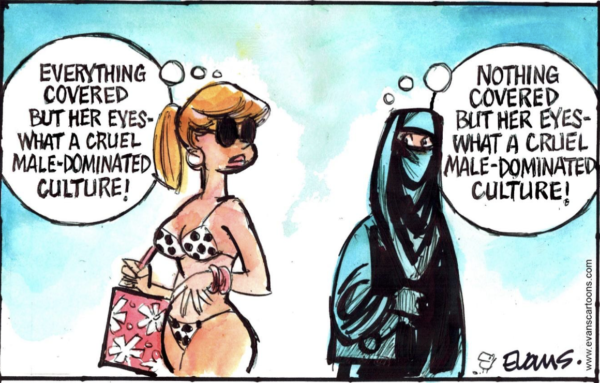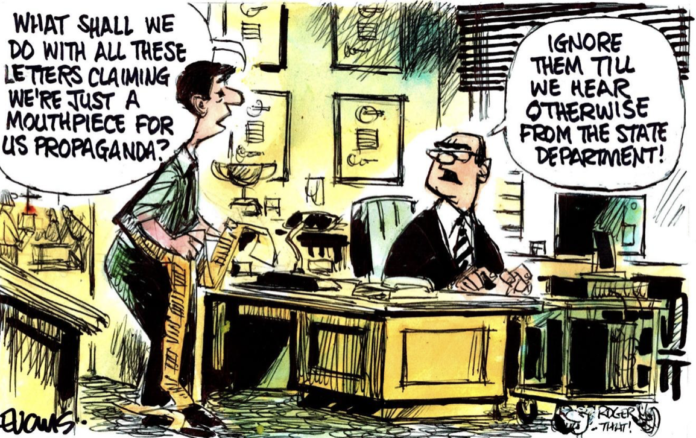With world powers competing for the primacy of their differing ideologies having ignited a new cold war, the battle for the hearts and minds of men is hotting up. And the West’s well-oiled persuasion machinery is using all its tried and “true” tricks to convince its vassal states, just who the bad guys are and who are the good. And so, with the fate of the world in the balance, the stakes couldn’t be higher.
As an ex-pat Kiwi living in Turkiye, I’m a lot closer to Donbas and Kiev, Syria and Armenia, Iran and Afghanistan, than to Wellington or Auckland. And so I take a close interest in how differently states are projected and, not least in respect of Turkiye, I question their assertions.
Despite the clear need to find another way between ideological extremes, not forgetting that both China and Russia are now in the capitalist camp, the West’s worldview still seems set in the concrete of cultural and historical bias, and the political and economic dichotomy of socialism versus capitalism.
Caught up in this charade, Turkiye, despite all its efforts to be an exemplary global citizen, seems nevertheless doomed to eternally be the victim of a thousand-year fear of and prejudice against Islam.

This has resulted not only in a denial of the debt Western civilisation owes to Islamic culture and learning, but a persistent failure to accept that Islam could have anything to teach it. And the consequence of that is a failure of the West to accept the role that Christianity played in the development of Western capitalist imperialism. And, despite post-modern atheism and godlessness, it still plays a role in defining Western political strategy.
The UK, for example, has never been a secular state – the monarch is the head of state and the established religion. And as such, the monarchy and the Anglican Church continue to be powerful forces of social control.
Though less formalised in the United States, religious blocs there still exert disproportionate influence on government via their respective institutions vis: the Pope and Roman Catholicism, Israel and Judaism, Protestant and eastern orthodox Christianity (Greeks and Armenians), and Mormonism.
There is also the development of Communist/socialist thought in the West in opposition to the unholy alliance of Christianity and oligarchic capitalism. An important pillar of this is atheism, based on the observation that religion is not only “the opiate of the masses,” as Marx described it, but also an active instrument of social control and enslavement.
Western thought tends to associate religion with right wing conservative political parties, because that’s the case in their societies. It can’t grasp the fact that Islamic-based parties like the Muslim Brotherhood (sibling-hood would be better gender-free Arabic and Turkishii translation) often fulfil the role that socialist/Communist parties do in the West. The big difference is that they tend to gain more widespread support because religion still plays an important part in the lives of ordinary people.
The West is also prey to the persistent and touching belief that allowing the people to vote for a “government” results in a democratic society. There’s some disagreement about who first said it, but that doesn’t make it less true: “If voting changed anything, they wouldn’t let us do it.”
Douglas Adams summed it up perhaps more aptly when he wrote in The Hitchhiker’s Guide to The Galaxy:
“The President [of the Galaxy] in particular is very much a figurehead — he wields no real power whatsoever. He is apparently chosen by the government, but the qualities he is required to display are not those of leadership but those of finely judged outrage. For this reason the President is always a controversial choice, always an infuriating but fascinating character. His job is not to wield power but to draw attention away from it. On those criteria Zaphod Beeblebrox is one of the most successful Presidents the Galaxy has ever had — he has already spent two of his ten presidential years in prison for fraud.”

So, why can’t Westerners of either the left or the right understand what’s going on in Turkiye? In answer to my own question I’d say, it’s because that long-standing inherited prejudice against Islam won’t allow them to accept that, for the following reasons, Islam in Turkiye is unique;
Turkish Islam is a result of its prophet’s teachings having been grafted on to the earlier shamanistic spirituality of the Turkic tribes.
It’s also important for the West to understand that Turks in Anatolia (Asia Minor) have a history of a thousand years of interaction with Christianity, and that a strong tradition of Sufi mysticism developed which downplays religious differences and emphasises common qualities and aims.
As to politics in Turkiye; – people in Turkiye expect to choose a leader, and then they expect him (sometimes her) to lead. And if they trust that leader, the majority will stick with him or her.
Another barrier to Westerners understanding Turkey better is because of cultural and historical brainwashing which, for instance, means they can’t accept that Turkiye may have perfectly valid reasons for its position on certain matters, such as the Armenian and Cyprus problem, Turkiye’s cross-border involvement in Syria, current difficulties with undersea drilling in the east Mediterranean and the purchase of air defence missiles from Russia. Just as they can’t (or won’t) recognise that Russia may have valid reasons for not wanting Ukraine to join the NATO “defence” club.
To sum up, because of its geographical location, standing with a foot in both Europe and The Middle East, and its unique cultural and ethnic composition, Turkiye is confronted by difficulties that few Western countries can appreciate. These force its government to face up to realities from which most Western countries can maintain a safe distance. Consequently, and since long experience has shown that Western powers cannot be trusted, a government has emerged in Turkiye that is pursuing domestic and foreign policies focusing on self-sufficiency and self-determination
Alan Scott, a former teacher at Auckland Grammar who for the past twenty years has lived in Turkey. Alan has been a long-time campaigner for political change, not least monetary reform, and actually stood for Parliament back in the 70s representing Social Credit. An ardent Turkophile, the essay Alan has written is an attempt to make people a little more understanding of Turkey’s difficult position in the world.





“Progressive” apologists for Islam are amusing.
“Turkiye, despite all its efforts to be an exemplary global citizen, seems nevertheless doomed to eternally be the victim of a thousand-year fear of and prejudice against Islam.”
What exactly are these efforts to be an exemplary global citizen? Continuing to deny the Armenian genocide? Gratuitously reconverting the Hagia Sophia and the Chora Monastery back into mosques? (Mustafa Kemal had turned both into museums). And do you think those moves by Erdogan are likely to ease, or heighten, fear and prejudice against Islam?
“It’s also important for the West to understand that Turks in Anatolia (Asia Minor) have a history of a thousand years of interaction with Christianity, and that a strong tradition of Sufi mysticism developed which downplays religious differences and emphasises common qualities and aims.”
As a result of said “interaction”, Christians now constitute only 0.3-0.4 % of Turkey’s population. Little moire than a century ago, the corresponding figure was over 20-25% https://en.wikipedia.org/wiki/Christianity_in_Turkey
Hmmm, how did that happen?
“Western thought tends to associate religion with right wing conservative political parties, because that’s the case in their societies. It can’t grasp the fact that Islamic-based parties like the Muslim Brotherhood (sibling-hood would be better gender-free Arabic and Turkishii translation) often fulfil the role that socialist/Communist parties do in the West. The big difference is that they tend to gain more widespread support because religion still plays an important part in the lives of ordinary people.”
“Progressive” apologists for Islam are blind to the reality that Islam is arguably more tolerant of inequalities than Christianity – though to be fair, this is more true of countries with Sharia law than of modern Turkey. But you’re stuck in an outdated worldview – nominally leftwing parties are no longer the parties of “ordinary people” in the West. Like Erdogan, Trump drew a lot of his support from “ordinary people” with no tertiary education. And have you already forgotten the British Conservative storming of the “Red Wall” of northern England?
You might like to read “Submission” by Houellebecq, which imagines a future France under sharia law. Although it’s a coalition with the left that brings the Islamist party to power, some hardline French conservatives soon come to realize they’ve got most of what they had long wanted – reduction of the state’s role in people’s lives, massive reduction of welfare, restoration of patriarchy and the centrality of the family, curtailment of women’s role in public life.
“The West is also prey to the persistent and touching belief that allowing the people to vote for a “government” results in a democratic society. There’s some disagreement about who first said it, but that doesn’t make it less true: “If voting changed anything, they wouldn’t let us do it.”
Yes, yes we know Western democracy is the worst form of government – except for all the others that have been tried. Try reading less Douglas Adams, and more George Orwell.
Certainly the RC Popes have no reason to love Islam or the Ottomans. On the other hand, given a choice, Eastern Orthodox Christians tended to prefer them to their treacherous western cousins. “we know Western democracy is the worst form of government – except for all the others that have been tried”. It’s never too late to try something new, such as opening your eyes to what’s actually going on in the world rather than regurgitating age-old prejudices and distortions. You patronisingly assume I haven’t read Orwell. Reading Douglas Adams might actually bring your world-view a little more up-to-date.
Kindly show me which bits of my comment involve “regurgitating age-old prejudices and distortions”. If you make claims like that, you’d better be prepared to back them up.
I didn’t assume anything about your reading – I suggested dusting off Orwell to remind yourself of the dangers of totalitarian regimes. It might help you appreciate what we take for granted in the West – free speech, a mechanism for non-violent changes of government, religious toleration etc.
As for trying something new – I’m open to persuasion, but authoritarian Islamism doesn’t seem the most attractive option.
Though I’m no fan of the Turkish state, I find plenty to love about the country and its arts. Especially Seljuk architecture, and recent Turkish literature and cinema. But Erdogan can take no credit for any of those charms of Turkish culture – quite the opposite, as his government has made a habit of prosecuting novelists for “insulting Turkishness”
https://www.theguardian.com/books/2021/nov/16/orhan-pamuk-charged-again-with-insulting-turkishness-nights-of-the-plague
https://www.theguardian.com/world/2006/sep/21/turkey.books
And you still haven’t got back to explain to readers what happened to the incredible shrinking Christian population of Turkey. 100% in 1,000 AD, 20-25 % in 1900, 0.3-0.4 % nowadays.
There’s none so blind, my old Scottish granny used to say, as those who will not see. Actually the AKParty government can take a lot of credit for the fact that contemporary Turkish cinema can now deal with issues such as military coups that were previously off-limits. Turkish cinema and TV is enormously popular in other Muslim countries, and perhaps surprisingly, South America.
Re Orhan Pamuk, he is a spoiled child from old money who used political dissent to get himself a Nobel Prize. Once he had that he gave up any thoughts of political activism. The court case against him was brought by a private nationalist/Kemalist extremist, not the government, and it was thrown out. Pamuk received no punishment, and lives free and happy in his comfortable wealthy Istanbul existence.
Re the Christians in Anatolia (there was no Turkey until 1923), maybe you can tell me first what happened to the Maoris in NZ: 1769, 100%; At 30 June 2021:New Zealand’s estimated Māori ethnic population was 875,300 (17.1 percent of national population). However, that probably doesn’t reflect the numbers who actually speak Maori as a first language and follow traditional culture and religious practices. Just curious.
Alan I never made any false claims about harmonious coexistence between peoples – you did. How does your whattaboutism redeem Turkish persecution of ethnic and religious minorities?
Love that word “whataboutism”. I can criticise you as much as I want and you have to defend yourself on my terms. You are absolutely not allowed to point out the beam in my eye.
You may like to check my reply to Anne’s list of questions below.
‘Yes, yes we know Western democracy is the worst form of government – except for all the others that have been tried’
Singapore?
“This has resulted not only in a denial of the debt Western civilisation owes to Islamic culture and learning,”
This and other claims you make in regard to “Islamic” science and mathematics indicate you confuse or are willing to conflate the religion with regional cultural influences. The Middle East and India are cradles and birthplaces of much philosophical, scientific and mathematical thought. This was going on in the area well before Islam appeared on the scene.
It is simply dishonest for the new religion to lay claim for existing cultural practises without clear evidence.
If a case is to be made that Islam was a driving force for scientific thought and innovation then one has to explain why it virtually ceased in the area by the 12th century, as Islam certainly didn’t go anywhere.
BTW, I found Turkey one of the nicest places I’ve ever visited, but that was decades ago, I’ve watched internal political developments there over the past 15 years with increasing dismay.
No problem, however, for Christianity to take the credit for the Renaissance and the rise of capitalism. I’m sure you will find reasons to disparage his work (eg he’s Turkish so what would he know?), but you might like to check out a historian by the name of Fuat Sezgin: http://www.fuatsezginsempozyumu.org/en/home/
BTW, like you, many Westerners preferred Turkey in the days when they were experiencing a CIA-sponsored military coup every ten years or so.
Comments are closed.